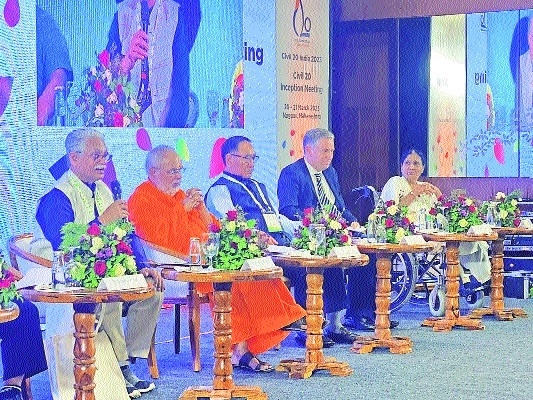‘Moral values, human ethos are civil societies’ strengths’
Date :22-Mar-2023

Sewa International Global Coordinator Shyam Parande (extreme left) speaking at a plenary session on Tuesday.
Staff Reporter :
Second Plenary Session of CIVIL20 India 2023 focuses on ‘Civil Society Organisations and Promotion of Human Values’
“Moral values and human ethos are the strength of civil societies and India has a long history of values which match the global values,” said Shyam Parande, Global Coordinator, Sewa International while chairing the plenary session on 'Civil Society Organisations and Promotion of Human Values’ on the second day of C-20 inception meeting. The session covered Working Group topics of Civil20 India 2023 like Sewa – Sense of Service, Philanthropy and Volunteerism; Vasudhaiva Kutumbakam – World is One Family; Diversity, Inclusion, Mutual Respect and Human Rights as Human Value. The speakers for this session were Naseema Hurzuk, President Saahas Disability Research and Care Foundation, Kolhapur; Dr Shashi Bala, President, International Council of Cultural Studies, India; Swami Parmatmanada, Arsha Vidya Mandir and Owain James, Global Director, 100 Million Campaign. The coordinators of the Working Groups were Santosh Gupta, CEO of Indian Social Responsibility Network (ISRN); Dr Vikrant Tomar, Convener of United Consciousness Global; Dr Joram Begi, Chairman of Vivekananda Kendra Institute of Culture (VKIC), Guwahati; and Durganand Jha, Executive Chairman at Centre for Policy Analysis. Swami Parmatma-nanda highlighted the need for respecting people and conducting our actions in such a way that nobody’s rights are trampled upon. Dr Shashi Bala highlighted the important aspects of C20 which are diversity, inclusion and mutual respect. She said, “Happiness should not be confined to enhancing financial and political power but by focusing on giving voice to the marginalised.” Dr Joram Begi proposed that diversity is the fundamental law of nature and is unavoidable. “The universe is interconnected, interrelated and interdependent and this implied inclusion for all,” he added.
‘If governments fear civil society, then they fear democracy’
“All civil societies are engaged in human development,” said Nivedita Bhide, All-India Vice President of Vivekananda Kendra, Kanyakumari, while chairing the plenary session on ‘Role of Civil Society in Promoting Human Development’ on the second day of C20 inception meeting on Tuesday. The session covered the following Working Groups: Gender Equality and Disability (GED); SDG 16+ and Promoting Civic Space, and Delivering Democracy – Retrospect and Prospect. Speakers in the session included Gabriella Wright, co-founder, Never Alone; Dr R Balasubramaniam, Founder and Chairman of Grassroots Research and Advocacy Movement (GRAAM); Meg Jones, Chief, Economic Empowerment at UN Women and Pedro Bocca, International Advisory Member of CIVIL20 India 2023. The coordinators of the working groups were Bhavani Rao, UNESCO Chair for Gender Equality; Nidhi Goyal, Co-founder and Director, Rising Flames; Jyotsna Mohan, Regional Coordinator (Asia), Asian Development Alliance and Dr Basavaraju R Shreshta, Executive Director of Grassroots Research And Advocacy Movement (GRAAM). “Realisation of “I am humanity” is the greatest action,” said Gabriella Wright while addressing topics of access to mental health care and gender equality. Bringing to fore many issues such as lack of allocation for women led development in budgets, Meg Jones also addressed the audience along with Bhavani Rao. Talking about the importance of free civic spaces as an essential part of democracy, Pedro Bocca said, “If governments fear civil society, then they fear democracy.” Proposing the concept of democracy as a way of thinking Dr R Balasubramaniam said, “Democracy should not be viewed as a political tool but as a development necessity.” Jyotsna Mohan also spoke on the occasion.
‘Technology, a good servant, but a dangerous master’
“Technology is the bridge between the real world and digital world. It’s negative impact must be examined before adopting it. It is a good servant, but a dangerous master,” said Dr Krishnashree Achuthan, Dean of Amrita Vishwa Vidyapeetham, at a Plenary Session of Civil 20 India 2023 Inception Confere-nce on Tuesday. As she spoke about the importance of cyber security, she said, “Cyber pandemic would be far more severe than the COVID-19 pandemic.” The fourth Plenary Session of the CIVIL20 India 2023 Inception Conference dealt with ‘Civil Society Organisations as Drivers of Innovation and Technology’ and covered Working Groups of Civil 20 including: Technology, Security, and Transparency; Preservation and Conservation of Traditional Arts, Crafts and Culture; Traditional and Innovative Ways of Livelihood and Employment; Education and Digital Transformation along with the Special Committee on Financial Issues. The session was chaired by Ambassador Vijay Nambiar, Sherpa, Civil 20 India, 2023. The speakers for the session were Alison Lynn Richards, Director, Intel Corporation; Jaya Jaitly, President and Founder, Dastkari Haat Samiti; Veronika Soboleva, Director of Development at International Collegiate Programming Contest (ICPC) Global Foundation; Binny Buchori, Member of the Civil20 India 2023 International Advisory Committee; and Vishpala Hundekari, founder of Ekibeki. The coordinators of these Working Groups, who also spoke during the session, are Dr Krishnashree Achuthan, and Dr Prema Nedungadi, Founding Director at AmritaCREATE along with Deepti George from Dvara Research, also the convenor of Special Committee on Financial Issues. Speaking on the issues of cybersecurity, Alison Lynn said, “There are downsides to it with cyberattacks on the rise. AI is also being used for disinformation and fake news.” Binny Buchori emphasised that even with advancements in technology, there are still nations which are left behind. “We needed to acknowledge the digital divide caused due to unequal access to finance,” she added. On the preservation and conservation of traditional arts, Vishpala Hundekari said, “Around 200 crafts in India are endangered. Crafts should be used as tools of social change.”